Bachelor Of Science In Foster Parenting
“We cannot solve our problems with the same thinking we used when we created them.”
What if you could get a Bachelor of Science in foster parenting? What if you went to school to become a foster parent and that was your ONLY job? Sounds a little strange, right? However, to me, this makes sense. This is an interesting thought, as this would create an entirely new profession: the Professional Foster Parent.
Let me show you why I think this is a good idea and why we must radically change the foster care system and turn it on its head. Here are five ways I looked at this transformational idea.
1. Starting with the end in mind: an alternative future in foster care.
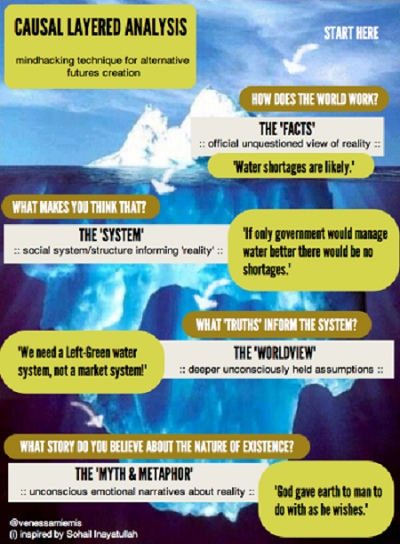
Have you ever had an uncomfortable feeling when you just knew what you were doing conflicts with what you know you should be doing? This is called cognitive dissonance and is present in the current foster care system. We hold this uncomfortable believe that people will always do what’s in the best interest of the child. It’s an uncomfortable belief because we also know it’s not true.
This brings to mind a quote from Helen Keller, “The only thing worse than being blind is having sight but no vision.” We fail to see what is right in front of us. This was the thought that drove me to start diving into this idea.
The method I used in looking at this concept is a futures research method focusing on in-depth analysis of current problems called Causal Layer Analysis (CLA). CLA was developed by Sohail Inayatullah and provides us a way to develop alternative futures. Read this article if you are interested in learning more about CLA.
Let’s look at a couple tools I used along with CLA.
The Futures Wheel
This tool assists us in anticipating future issues. This also helps us create new possibilities by seeing the world from unconnected to a complex connected reality.
Continuing with our foster care example, let’s look at the current problem and see what the future looks like if we fail to change. Let’s look at the consequences and what is causing the litany of issues to appear on the “surface” in its current form.
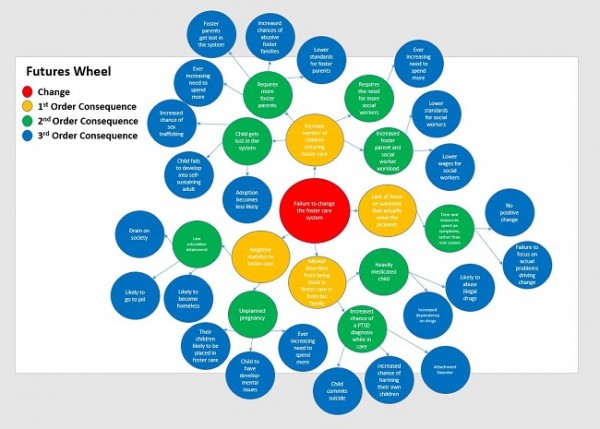
Now, let’s use the same technique and look at the changes if we were to professionalize foster parenting.
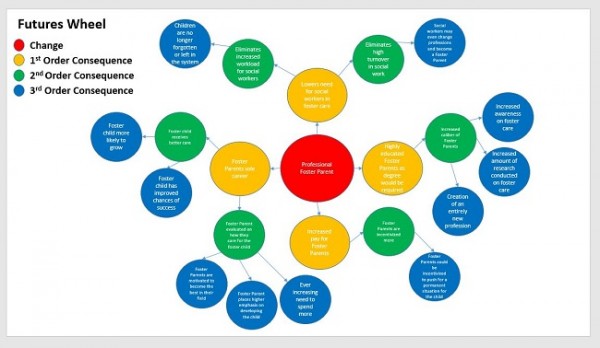
Backcasting
This is a navigational tool we can use to solve difficult or “wicked” problems. Here, we move backwards from our desired vision to the present. Another way to think of it is to think of scouting ahead. Let’s take a look at this with three transformational future realities in foster care.
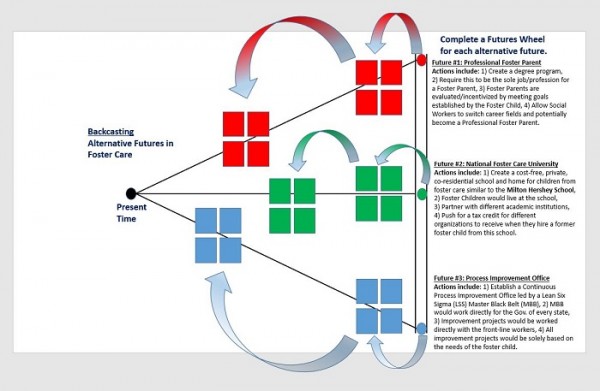
2. Is anyone doing this yet?
There are similar approaches, yet no one is doing this to the scale I am discussing. Let’s look at three similar approaches.
By the Bridge
The closest to my concept is By the Bridge. Originally founded in 2002 by foster parents as a therapeutic fostering organization spread across the UK. Currently, this independent organization finds and trains foster parents. This program provides internal training and better pay for foster parents. This is a great step, yet it is not near the level needed. You can find more information about them at Bythebridge.co.uk.
Wraparound Milwaukee
This was a pilot for a professional foster care program designed to provide care and support to female youth with serious emotional and mental health needs between ages 13-17 years of age. This pilot program was only afforded to women. To become a professional foster care mother, there were two levels of training provided by Wraparound. Yet another good step in the right direction, but not to the scale needed for transformational change. Find more about this pilot program at County.milwaukee.gov.
Let it Be Us
Let it Be Us is another pilot program for professional foster parenting in Illinois. This program provides similar compensation to normal foster parenting, but focuses directly on a targeted population of children needing therapeutic care. You can find more about them at Letitbeus.org.
3. We go to school for just about everything else, why not foster parenting?
Think about it. We go to school for just about every other profession, why not foster parenting? Think of similar programs, such as: 1) Child and family studies; 2) Social work; 3) Psychology; and 4) sociology. Yet, a degree in foster parenting would be more specialized. Think of all the different types of employment opportunities these four programs lead to. However, not one of them offers a clear and direct route. Not even social work. A degree in foster parenting could combine elements of every one of these programs. With the clear need for foster families and the ever-increasing number of children entering foster care, I do not anticipate the opportunities in this field going away.
4. Incentivize the new profession and bring in the best.
This statement will be a little controversial, but it is what it is.
We pay people more to take out the trash and flip burgers than we do to care for our underprivileged children.
Don’t believe me? Let’s take a look.
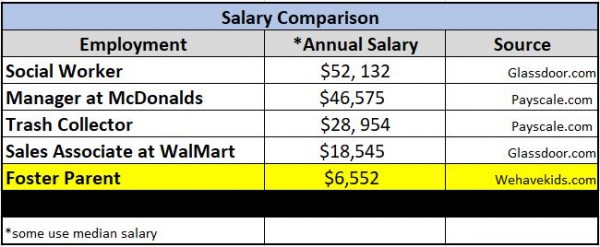
If we want the best and brightest people to care for our children, we must incentivize them to jump into this new profession. This is not an attack on foster parents, as there are some great foster parents in the system. Trust me, I had some of the best. But if we want better foster parents, we have to set the system up so the best will make their way toward the profession.
5. Where do we start?
Here is the fun part. Since this profession does not exist, we can create it from nothing with the ideal vision in mind (think Backcasting from earlier). We have the vision (Professional Foster Parent), now let’s look at some of the immediate actions we can take to get this rolling. Here are a few options.
Run a True Pilot
Think of the synergy we could create if a university and a wealthy private philanthropist would combine efforts here. We could run a pilot, where a degree program is created and the first set of professional foster parents were privately funded. This first set of foster parents would be required to have no other employment. Essentially, this would be their full-time job. Of course, they would have to be compensated appropriately. A good starting point would be the average salary of a social worker.
Merge with Social Work
Social workers (not all) might be some of the best foster parents. They typically understand the challenges and have an education geared toward the field. What would happen if they were paid to be foster parents, not social workers?
Government Funded
What is the first question you would ask under this option? How can we afford to fund it, right? Well, we already spend quite a bit of money on the foster care system and we spend more every year. So, obviously that’s not working. The question should be… How can we afford not to fund it?
I like to use metaphors and analogies to describe things. So, let’s use one here.
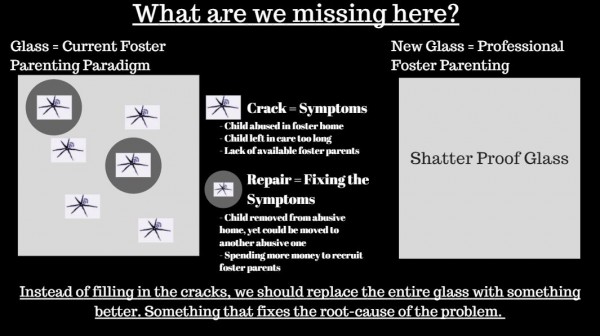
I will leave you with this.
“We cannot solve our problems with the same thinking we used when we created them.” – Albert Einstein
